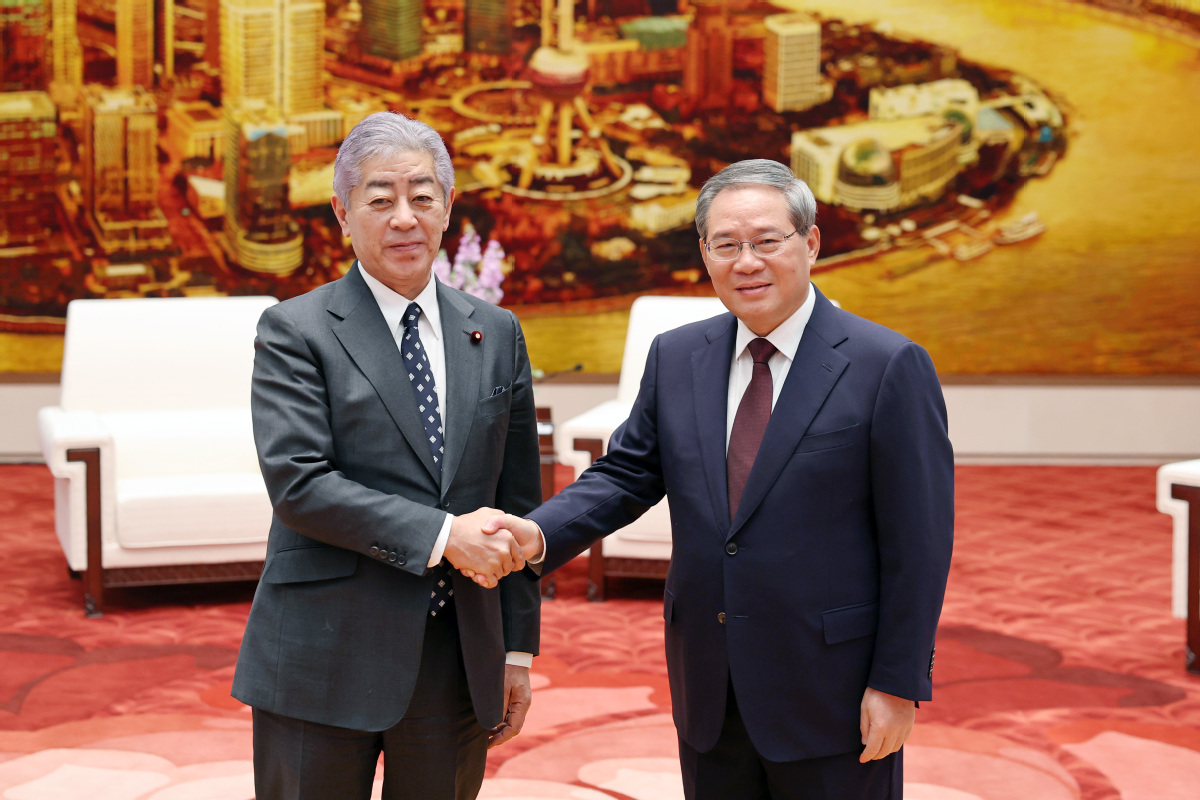Beijing, Tokyo chart relations during talks
Both nations working to bring certainty to bilateral, regional agenda, observers say
By Zhang Yunbi | China Daily | Updated: 2024-12-26 07:11

The China-Japan relationship is at a critical phase in efforts to improve ties, and the fruitful outcome of Japanese Foreign Minister Takeshi Iwaya's first visit to China in his current post illustrates efforts by Beijing and Tokyo to add certainty to the bilateral agenda and the region's stability, analysts said.
On Wednesday, Premier Li Qiang and Foreign Minister Wang Yi met separately with Iwaya in Beijing.
Wang and Iwaya also attended the second meeting of the China-Japan High-Level Consultation Mechanism on People-to-People and Cultural Exchanges. The two sides reached a 10-point consensus on deepening cooperation in areas such as youth exchanges, education and culture, tourism, sports and media.
The visit comes after President Xi Jinping and Japanese Prime Minister Shigeru Ishiba met in Peru last month.
The two leaders agreed to make joint efforts to comprehensively advance the China-Japan strategic and mutually beneficial relationship and commit to building a constructive and stable China-Japan relationship that meets the requirements of the new era.
Premier Li told Iwaya that Beijing is willing to work with Tokyo to remain committed to this correct direction, realize the consensus reached by the two leaders, and drive the sustained and healthy development of bilateral ties and pragmatic cooperation to yield more results.
Li pointed out that it was a solemn commitment made by the two countries to be each other's partner and not to pose a threat to each other, and Japan should work together with China to constructively and properly manage differences.
Currently, "the instability and uncertainty in global development is on the rise", and the two sides should expand economic and trade relations, deepen mutually beneficial cooperation, and better benefit the two countries' enterprises and peoples, he added.
Iwaya said Japan is willing to work with China to strengthen exchanges at various levels, especially subnational exchanges.
Tokyo is willing to promote win-win cooperation and improve public opinion, and build a constructive and stable Japan-China relationship, he added.
Toshihiro Kitamura, assistant minister and press secretary of Japan's Ministry of Foreign Affairs, said at a briefing on Thursday evening that resolving global issues together is "always beneficial to both countries", and Tokyo looks forward to hosting the series of China-Japan-Republic of Korea trilateral meetings next year.
The premier's meeting with Iwaya was "a constructive dialogue", and the wide-ranging items of the bilateral agenda made the foreign ministers' face-to-face discussion go beyond the intended two hours, finally reaching three hours, Kitamura, in response to a question from China Daily, said at the briefing.
Also on Wednesday, Japan's Ministry of Foreign Affairs issued new relaxed measures for short-term stay visas for Chinese nationals, including the introduction of a 10-year multiple entry tourist visa for individual visitors.
Iwaya said Japan appreciates China's granting visa-free treatment to Japanese citizens and will further relax its visa policy to facilitate people-to-people exchanges.
Yang Bojiang, director-general of the Institute of Japanese Studies at the Chinese Academy of Social Sciences, said, "The two countries should effectively hedge against the uncertainty of their external environment by increasing the certainty of China-Japan relations."
The two sides should "continuously tap into and revitalize the value assets of China-Japan ties", he added. "China and Japan should keep improving the relationship by deepening cooperation."
In meeting with Iwaya later in the day, Foreign Minister Wang put forward a six-point proposal on advancing China-Japan ties. The six points are: calibrating strategic perceptions; maintaining mutual trust; boosting communication and dialogue; adhering to win-win cooperation; strengthening people-to-people exchanges; and properly addressing contradictions and divergences.
The two countries should "work together to maintain the stability of the global supply chain and a fair and open trade and investment environment" and "avoid letting their differences define or even dominate their relations", Wang said.
He called on Tokyo to look at China's development in good faith, and to honor its commitments on major sensitive matters such as history and the Taiwan question.
Iwaya said that Japan is willing to boost the positive agenda in bilateral relations, reduce unsettled issues and properly manage differences, and Tokyo respects and understands China's position on the Taiwan question.
On the historical issue, Iwaya said Tokyo will continue to uphold the clear stance of the Murayama Statement, express deep reflection and heartfelt apology, and insist on "facing history squarely and looking to the future".
- Neighbors can take twilight of the Biden era as dawning of a more harmonious new day: China Daily editorial
- Japan's toxic water discharge plan based on lies
- Japan's FM to visit, discuss exchanges
- Cheaper intl airfares make outbound tourism soar
- Honda, Nissan agree to discuss merger, signalling massive industry shift
























